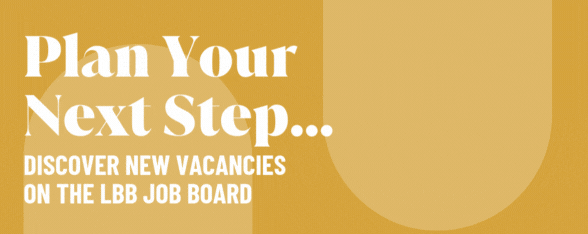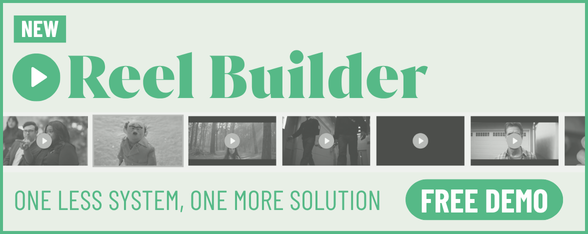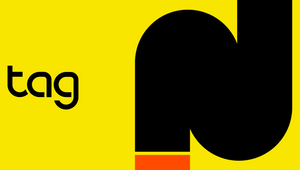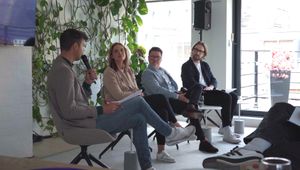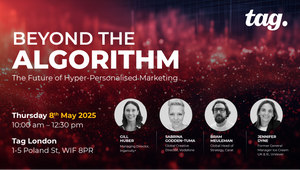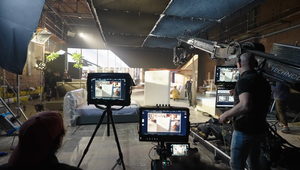
Emma Marsland: “I Caught a Glimpse of Advertising and Knew It Was for Me”

Emma Marsland joined the world of production for the first time when she started her role at Tag in March 2020. Prior to this, she spent over 25 years in advertising, holding a series of prestigious roles in agencies such as Oglivy, TBWA London, Euro RSCG, Wieden+Kennedy, and ENGINE UK.
Raised in Buckinghamshire, Emma spent most of her career living and working in London, before making the move back to the country - “I’ve come home, which I never thought I would.” Aspirations to become a showjumper, a popstar and a journalist crossed her mind, but it was a week of work experience at Courage’s marketing department and a week at (the then) BMP that shaped the path to where she is today. Something clicked: “I became very blinkered about my career path; there was no either/or. When I got a taste of it myself, I knew I wanted to be a part of it. I’ve never regretted it - I have always enjoyed what I do.”
Attracted by the variety and the people in the industry, Emma feels as excited about the work today as she did when she first started, highlighting the “many opportunities to learn, different disciplines, different skills”, calling the experience of working at agencies a “true cross-pollination”. A chat with old friend Mickey Brooks, Tag’s head of operations, was the final piece of the puzzle, leading Emma to make the lateral career move from agency to production-side.
Alongside her very busy role at Tag, Emma also runs a styling business - Pony Club Goth Style, born out of her love for great clothes and their transformational power. She’s currently completing a course at the London College of Fashion to cement her knowledge of the business side of styling.
Emma tells LBB all
about why production is the natural space for her to be in now, why Tag is like
“joining the production mothership”, and her passion for a fantastic outfit.
LBB> You spent
years working at creative agencies before moving to production - what changed
to entice you in?
Emma> I have always worked with production companies, and
I was always quite interested in the other side of the fence, how it all works.
I suppose slightly naively, from a sort of more of a post-production point of
view, because I've made loads of TV ads in my time and always really enjoyed
being in the edit suites and seeing all the different specialists doing the
colouring, the grading, the sound, and editing. I thought I'd like to get a bit
closer to that. Also, the commercial aspect; I think it’s invaluable to have a
close understanding of how a business works. Properly understanding P&L,
what influences profitability; things I sort of knew before, but to nothing like
the granularity that I'm learning now.
LBB> Tell us what brought you to Tag specifically and what excites you about where it’s at right now and where it’s going?
Emma> One of the things I really appreciate about my new role at Tag is the learning opportunity. I joined in March, having spent 27 years in advertising at creative agencies. It’s a big move, but a lateral one. I have worked at quite a few agencies and I've always thought of Tag as the original production company. The thinking went that if I’m going to join a production company, I should join the mothership - the original production company.
We have a massive tech team, product developers, real experts. That's one of the things that really interested me. It's also the scale - the scale of what we can do is extraordinary and the rate of change with so many innovative new methods coming to the market. And when I met all these fantastic women - Andria Vidler, Tamara Lover, Helen Weisinger – through the interviews, that clinched it for me. I’ve never worked somewhere that has such a strong female leadership.
LBB> Your current role is still working with agencies. Why do you feel agencies really need a production-led model like Tag’s to support their work these days?
Emma> There’s been a trend over the last decade of
everyone trying to do and be everything. Media opportunities and channels are
proliferating, the landscape is very fragmented, loads of platforms are running
content and everyone thinks they need to offer all the capabilities with
home-grown teams. But I think there's a real need for agencies to work with
production companies who can do that efficiently and at scale. Then the
agencies can do what they do brilliantly – come up with the great ideas and we
can execute them. Then, everyone plays to their strengths. At Tag, we’re cost
effective as well as enormously powerful in terms of scale, reach and
adaptation. We've built and tested it for years. Some still do try and do it
themselves but it’s not possible to achieve on the same scale and with the same
efficiency; most agencies are just not set up for it.
LBB> What trends do you feel have led to this demand?
Emma> There’s a desire and expectation for more personal
communication. We are seeing more and more clients branch out via DCO (dynamic
creative optimisation). With how much data is available, customers have an
expectation that brands will know more about them, hyper-targeting their
desires. In a way, it’s a trend of the industry’s own making as the industry
established this, people got used to it, and now it feeds itself. Brands are
also trying a lot of different things to keep up with and get ahead of social
media platforms; scratch the next itch, so to say. TikTok is a good example,
albeit a few years old now. I do think that the industry provokes a lot of the
trends that it then ends up chasing - it snowballs - with consumers left hungry
for more content served in different ways.
LBB> Do you feel the increased demand for production was borne out of the pandemic in any way or were we already heading down this route?
Emma> I think it’s more of an evolution of that trend.
The pandemic played a small part - everyone was searching for a distraction
while locked down.
LBB> Do you think it's important for agencies to work with someone like yourself in the production world that understands how things tick in an agency?
Emma> It can only help! Certainly, a lot of us who run
relationships with agencies are ex-creative agencies ourselves. That helps
because you speak the same language. I don't think it's vital, but I think it
helps. Because you're more of a bridge between the two parties, we all
understand each other. We know the pressures and the process on either side.
LBB> And when it comes to your new role at Tag, what will you be focusing on?
Emma> I’ll be working really closely with clients. I’ve been
working with The&Partnership, running the accounts we partner with them on,
as a portfolio in itself. And now I'm going to be back to working with clients
in a different division of Tag. I’ll be bringing my business development and
account handling experience to the table. I'm looking forward to it - I've
missed the relationship with clients. I've also been missing making work. I'll
be reunited with a previous client, which will be really fun and interesting
too, but from a completely different standpoint.
LBB> What’s your advice to people looking to make a lateral career move?
Emma> It's something I'd thought about doing a couple of times in my life. I wish I'd gone to work in New York when I was in my 20s. I also toyed a couple of times with going client-side. So, I would say to anyone - if an opportunity arises that feels right, to broaden your career experience - to take it. It’s not like I regret not doing it earlier because I think it was obviously the right time for me to do it now and I’m enjoying the challenge of learning a whole load of new stuff in the move to production after decades in advertising.
In general, I think it's one of those things where if it
excites you, you should do it. I'm such a gut feel person anyway - if it feels
right, you should do it. That's kind of one of my guiding influences in life in
general. It's a great thing to do to learn new things and broaden your
experience, whatever you end up doing with it. If you're a career path person,
then I think having interesting and slightly lateral experience does make you
more valuable.
LBB> What inspires and motivates you outside of work?
Emma> I’ve got a very keen interest in fashion. I love
going to the cinema and exhibitions. Pre-pandemic, I really enjoyed going to
immersive theatre experiences like Punchdrunk and You Me Bum Bum Train. Just
going out in London - theatre, gigs - it’s all a lot of fun. I do live out in
the country, and I’ve got a fantastic group of friends here. Going for a nice
walk is always enjoyable. I’ve also got two young-ish boys and I do a lot of
art with one of them while running around a field (badly) after the other. I’m
working on organising a clothes sale locally where I’ll also be giving styling
advice, and I will be running a styling workshop at Tag in December. I love
reading too; we have a lovely book club going on in the village. I’m generally
drawn to beautiful experiences and things, which can be dangerous at times!
LBB> You’re the founder and stylist behind the fantastically named Pony Club Goth Style. Can you tell us the story behind it and what it is that excites you about great clothes?
Emma> When I was growing up, I really loved horses and I was lucky enough to have a horse and a pony, which is where the Pony Club part comes from. I also went through a real goth phase. I tried to reconcile being a member of the pony club and being a goth as I didn’t fit neatly into either world, and it was that clash of styles and cultures that stuck with me and influenced by beliefs about style.
Clothes just bring so much joy to me. I'm all about trying
to help people find the same joy in clothes and getting dressed that I do. And
it's not to say that they all have to dress like me, but I think it’s finding
the joy in your own wardrobe and finding what works for you and in unexpected
combinations. I don't believe that things often clash in a bad way. I love a
bit of pattern clash, texture, combinations. I believe in not keeping anything
for best. If you want to wear sequins on a Monday, you wear sequins on a
Monday. Otherwise, things just don't get worn. Wear your sequins with your
tweed and your flowers with your stripes. I suppose that's where the Pony Club Goth
philosophy comes into it. It's where two worlds collide and how to make them
work. So yesterday I was wearing an enormous, (highly flammable) taffeta, black
dress with spots for Halloween, and then my tweed coat on top. And that to me
is the epitome of a Pony Club Goth outfit.
LBB> What was your relationship to clothes like through the lockdowns and working from home periods - did you continue putting together outfits or give in to loungewear?
Emma> It really varied, it depended very much on what I
was doing. Some of the time it was a combination of business on the top half,
loungewear on the bottom. I think we all did a bit of that, but I did really
miss wearing my proper clothes. There were so many dresses that I didn’t wear
because I was at home. Now, every time I go to the office, I wear a different
dress because I want to get the wear out of them. I do try to make an effort
now as much as possible. I’m a maximalist, definitely, all the way.






